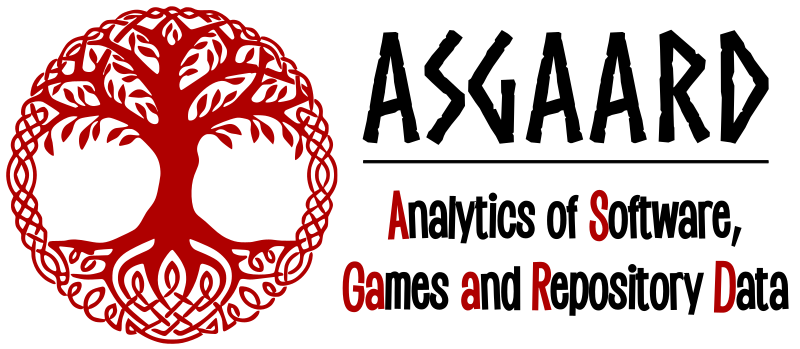( = Paper PDF,
= Paper PDF,  = Presentation slides,
= Presentation slides, ![]() = Presentation video)
= Presentation video)
Quang N. Vu; Cor-Paul Bezemer
Improving the Discoverability of Indie Games by Leveraging their Similarity to Top-Selling Games Identifying Important Requirements of a Recommender System Inproceedings
International Conference on the Foundations of Digital Games (FDG), pp. 1–12, 2021.
Abstract | BibTeX | Tags: Computer games, Game discoverability, Indie games, itch.io, Steam
@inproceedings{Quang21,
title = {Improving the Discoverability of Indie Games by Leveraging their Similarity to Top-Selling Games Identifying Important Requirements of a Recommender System},
author = {Quang N. Vu and Cor-Paul Bezemer},
year = {2021},
date = {2021-04-07},
urldate = {2021-04-07},
booktitle = {International Conference on the Foundations of Digital Games (FDG)},
pages = {1--12},
abstract = {Indie games often lack visibility as compared to top-selling games due to their limited marketing budget and the fact that there are a large number of indie games. Players of top-selling games usually like certain types of games or certain game elements such as theme, gameplay, storyline. Therefore, indie games could leverage their shared game elements with top-selling games to get discovered. In this paper, we propose an approach to improve the discoverability of indie games by recommending similar indie games to gamers of top-selling games. We first matched 2,830 itch.io indie games to 326 top-selling Steam games. We then contacted the indie game
developers for evaluation feedback and suggestions. We found that the majority of them (67.9%) who offered verbose responses show positive support for our approach.We also analyzed the reasons for bad recommendations and the suggestions by indie game developers to lay out the important requirements for such a recommendation system. The most important ones are: a standardized and extensive tag and genre ontology system is needed to bridge the two platforms, the expectations of players of top-selling games should be managed to avoid disappointment, a player’s preferences should be integrated when making recommendations, a standardized age restriction rule is needed, and finally, the recommendation tool should also show indie games that are the least similar or less popular.},
keywords = {Computer games, Game discoverability, Indie games, itch.io, Steam},
pubstate = {published},
tppubtype = {inproceedings}
}
developers for evaluation feedback and suggestions. We found that the majority of them (67.9%) who offered verbose responses show positive support for our approach.We also analyzed the reasons for bad recommendations and the suggestions by indie game developers to lay out the important requirements for such a recommendation system. The most important ones are: a standardized and extensive tag and genre ontology system is needed to bridge the two platforms, the expectations of players of top-selling games should be managed to avoid disappointment, a player’s preferences should be integrated when making recommendations, a standardized age restriction rule is needed, and finally, the recommendation tool should also show indie games that are the least similar or less popular.
Quang N. Vu; Cor-Paul Bezemer
An Empirical Study of the Characteristics of Popular Game Jams and Their High-ranking Submissions on itch.io Inproceedings
International Conference on the Foundations of Digital Games (FDG), pp. 1–12, 2020.
Abstract | BibTeX | Tags: Empirical software engineering, Game development, Game jams, itch.io, Mining software repositories
@inproceedings{Quang20,
title = {An Empirical Study of the Characteristics of Popular Game Jams and Their High-ranking Submissions on itch.io},
author = {Quang N. Vu and Cor-Paul Bezemer},
year = {2020},
date = {2020-04-14},
urldate = {2020-04-14},
booktitle = {International Conference on the Foundations of Digital Games (FDG)},
pages = {1--12},
abstract = {Game jams are hackathon-like events that allow participants to develop a playable game prototype within a time limit. They foster creativity and the exchange of ideas by letting developers with different skill sets collaborate. Having a high-ranking game is a great bonus to a beginning game developer’s résumé and their pursuit of a career in the game industry. However, participants often face time constraints set by jam hosts while balancing what aspects of their games should be emphasized to have the highest chance of winning. Similarly, hosts need to understand what to emphasize when organizing online jams so that their jams are more popular, in terms of submission rate. In this paper, we study 1,290 past game jams and their 3,752 submissions on itch.io to understand better what makes popular jams and high-ranking games perceived well by the audience. We find that a quality description has a positive contribution to both a jam’s popularity and a game’s ranking. Additionally, more manpower organizing a jam or developing a game increases a jam’s popularity and a game’s high-ranking likelihood. Highranking games tend to support Windows or macOS, and belong to the “Puzzleâ€, “Platformerâ€, “Interactive Fictionâ€, or “Action†genres. Also, shorter competitive jams tend to be more popular. Based on our findings, we suggest jam hosts and participants improve the description of their products and consider co-organizing or co-participating in a jam. Furthermore, jam participants should develop multi-platform multi-genre games. Finally, jam hosts should introduce a tighter time limit to increase their jam’s popularity.},
keywords = {Empirical software engineering, Game development, Game jams, itch.io, Mining software repositories},
pubstate = {published},
tppubtype = {inproceedings}
}


